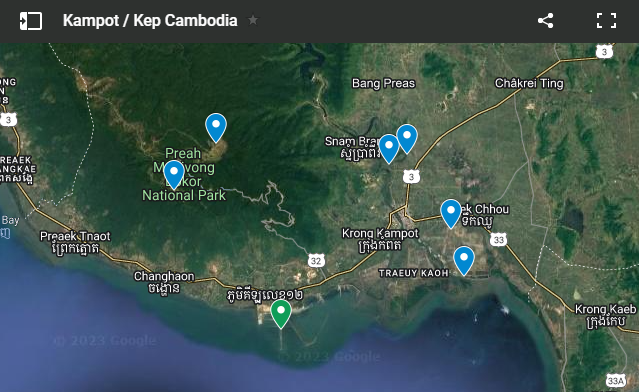Blog

Introduction
Kep and Kampot, Cambodia's hidden gems, present a plethora of opportunities for sustainable tourism. With lush jungles, breathtaking landscapes, and vibrant communities, these regions are increasingly attracting socially conscious travelers. This article explores how small operators can harness social media and unique offerings to reach the younger Instagram crowd and multimedia enthusiasts.
- Details
- Hits: 2176
Read more: How to Market Sustainable Tourism in Kep and Kampot, Cambodia

If a destination wants to attract digital nomads, what should it consider and what can it do policy-wise to attract them?
- Details
- Hits: 1980
Read more: Tourist Visa Validity - Digital Nomads - Accommodating Long Stay Visitors

1- How to use Facebook and Instagram to attract clients that will book tours directly with the supplier.
- Details
- Hits: 2119
Read more: How to Sell Tours and Attractions Directly to End-Users Using Social Media

Destination Management Companies (DMCs) in developing countries face unique challenges in light of macroeconomic events like rising inflation, escalating energy prices, and inconsistent service from local and long-haul airlines. Crafting suitable strategies to counter these adverse situations is crucial for a DMC's survival and growth.
- Details
- Hits: 3461

Embrace the Data-Driven Approach: SEO and Tourism-centric Social Media Strategies for Small Businesses
Analytics / Research / Target Markets -- Data-driven for the Small Operator
- Details
- Hits: 3127
Read more: Data-driven Approaches for Small Operators in Tourism and Experiential Tours
State of the World: Tourism & Economics in 2025
A Turbulent Geopolitical Landscape
The ongoing war in Ukraine and escalating tensions in the Middle East continue to weigh heavily on global tourism. The Red Sea, now closed to many vessels due to Houthi activities, has significantly impeded travel routes connecting Europe and Asia, forcing a reshaping of traditional travel corridors. As these crises affect economic priorities and disrupt established pathways, their impacts reverberate throughout the global tourism sector. While some emerging destinations are capitalizing on these shifts in traveler preferences, uncertainty remains the dominant theme in international relations.
Shifting Economic Tides
The global economy continues to exhibit notable inconsistency across regions. Despite international tourism recovering to approximately 97% of pre-pandemic levels in early 2024, the recovery remains uneven across markets. The Chinese outbound market, once the world's largest, has yet to return to its former prominence—highlighting how critical specific demographics are to the industry's overall health.
Notable economic trends affecting tourism include:
- Regional disparities: Indian and subcontinent travelers are performing better than most, while Chinese outbound travel remains subdued
- Potential energy volatility: While energy prices are currently low, the risk of an oil shock looms as a significant threat that could rapidly reshape travel affordability
- Global debt pressures: Both public and private debt burdens are intensifying as nations contend with higher interest rates, acting as a brake on consumer spending and disposable income
- Persistent inflation: Currency fluctuations and stubborn inflation continue to affect travel budgets, pushing many tourists toward more affordable destinations or domestic options
Economic shocks are likely to continue throughout 2025, with impacts varying dramatically by region due to currency dynamics and ongoing shifts in global economic power structures.
Demographic Realities in the Developed World
Aging populations across Europe and other developed regions are fundamentally altering established travel preferences and patterns. These demographic shifts necessitate a rethinking of traditional tourism products and offerings. Wellness-focused experiences, slower-paced itineraries, and more immersive travel opportunities are gaining prominence as the industry adapts to serve these evolving priorities.
Meanwhile, younger demographics demonstrate strong preferences for sustainability and authenticity, further reshaping the types of experiences in demand and driving change throughout the tourism value chain.
The AI Revolution in Travel
Artificial intelligence is rapidly transforming established structures across the travel industry, determining winners and losers in unexpected ways. Voice search capabilities from mobile devices now allow travelers to locate specific properties or activities with minimal friction, challenging traditional intermediaries. This technological shift is forcing fundamental adjustments to:
- Search engine optimization strategies
- Aggregator platforms like Expedia
- Global Distribution Systems (GDSs)
- Commission structures and booking patterns
Perhaps most significantly, large language models train on available data that can inadvertently favor established players over emerging ones, potentially marginalizing smaller destinations and companies. Businesses of all sizes now require coherent AI strategies to avoid becoming invisible to the majority of travelers who book directly and gather information from diverse sources.
This creates particular pressure on Destination Management Organizations (DMOs) to enhance their digital competence, including proper indexing of attractions and prominent listing of sub-regional destinations. The rise of smaller, more agile DMOs utilizing data-informed strategies represents a significant shift in destination marketing approaches.
The Road Ahead: Resilience and Reinvention
As the global travel industry charts its path forward, resilience and adaptability have emerged as defining traits. Domestic tourism continues to serve as a lifeline for many regions, while integration of sustainability principles across the supply chain offers hope for a more balanced future.
Information ecosystems have also fragmented, with individual travelers often sourcing news from personally trusted sources rather than official channels, challenging governments' ability to control destination narratives.
Travel and tourism will continue adapting to the realities of our rapidly changing world. From geopolitical complexities to economic realignments, the sector's recovery and growth will depend on innovation, collaboration, and a renewed commitment to creating enriching, responsible travel experiences. While uncertainty persists, the potential for meaningful reinvention remains boundless.
- Details
- Hits: 228618